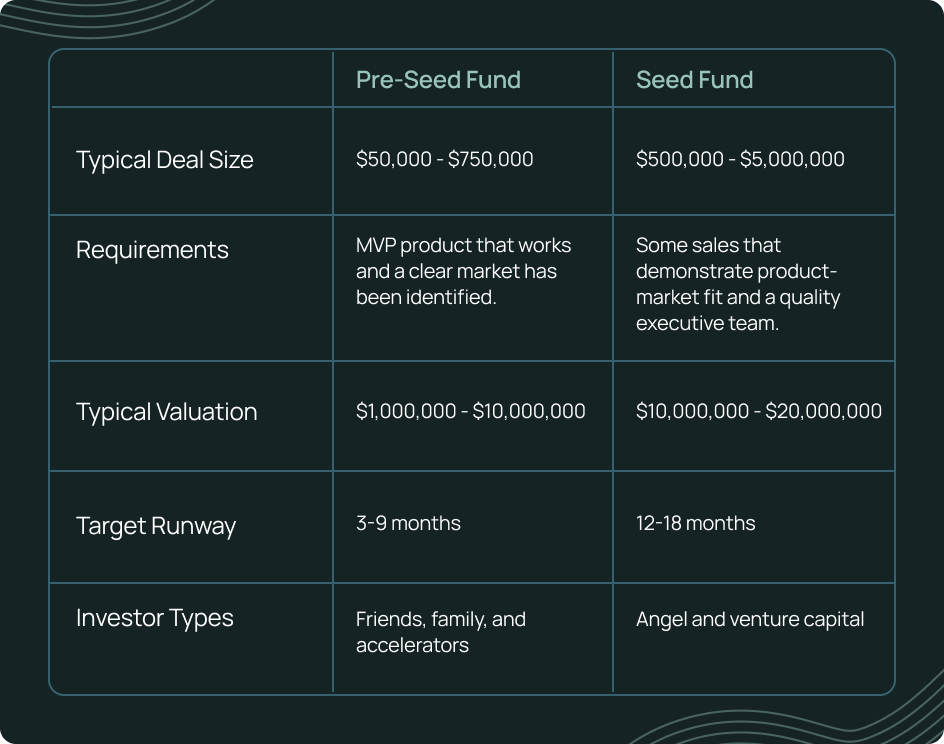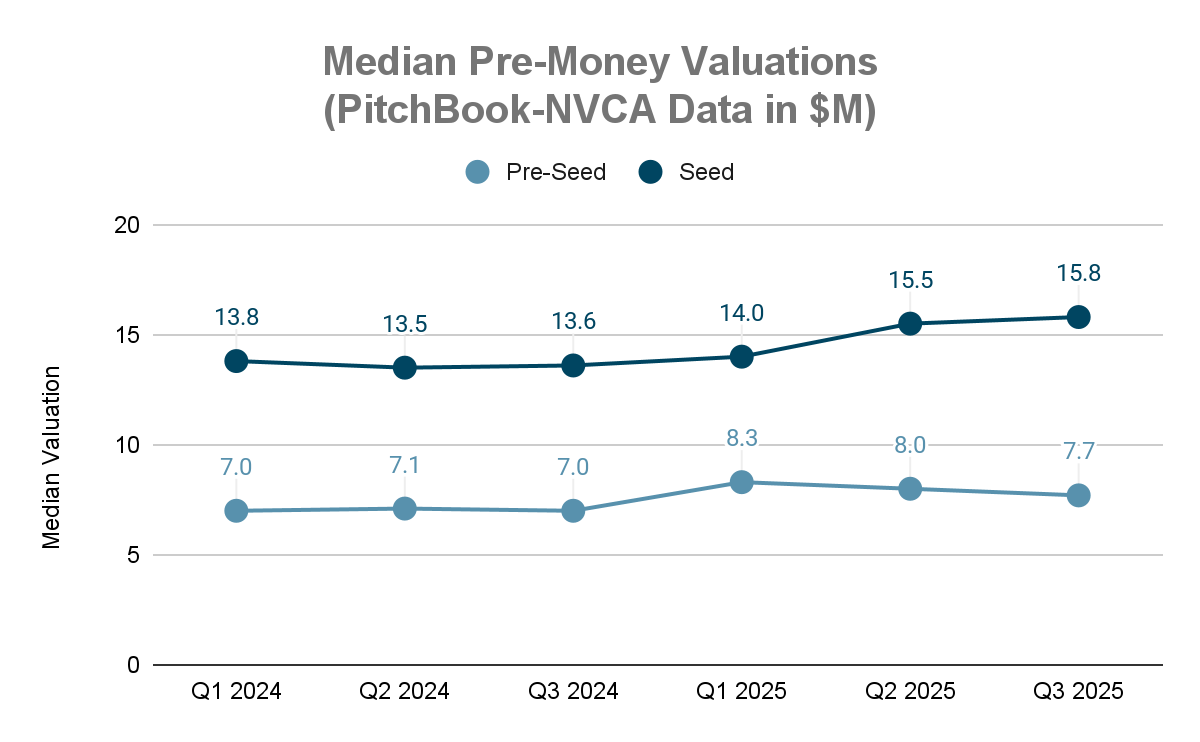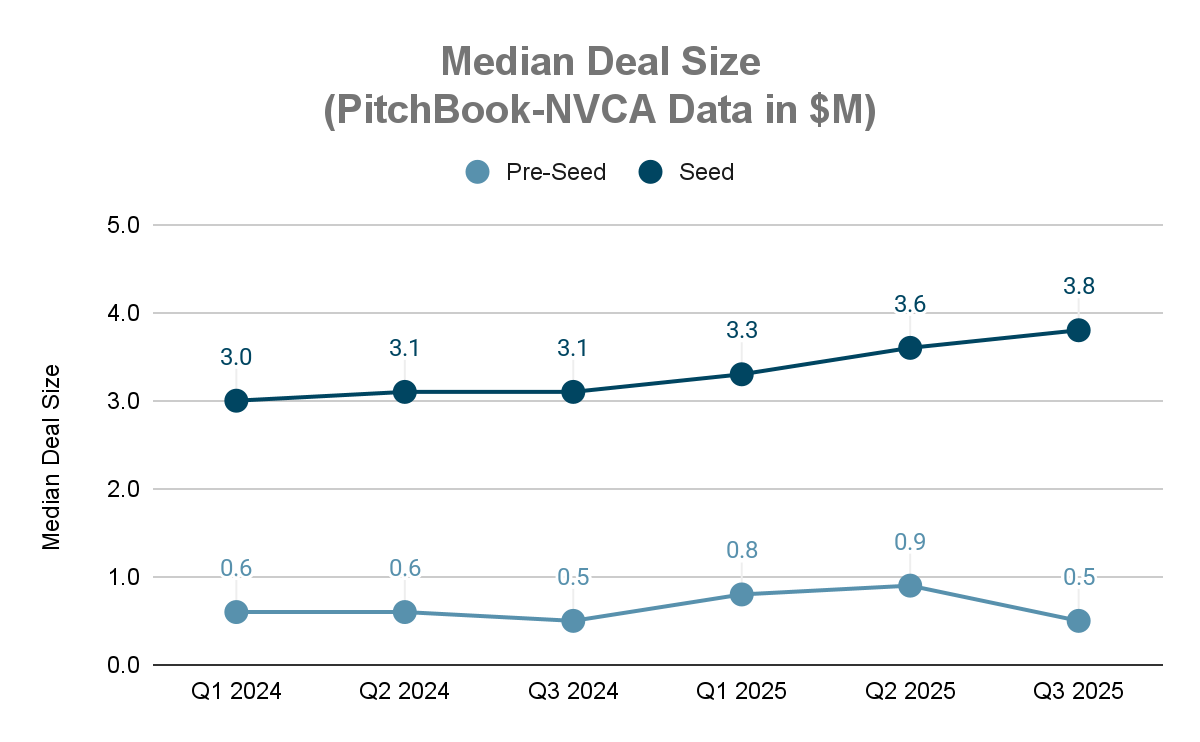Each funding stage has specific criteria that founders should meet before seeking funding. Most investors expect companies to have hit these typical milestones before they offer to fund, but there can be wiggle room depending on the investor.
Pre-seed and seed rounds are where founders acquire funding to start their businesses, but there are essential differences between the two.
What are the key differences between pre-seed funding vs. seed funding?
Timing, amount of money raised, valuation, and product or development stage are the four defining factors that determine what stage of funding you’re in.
During a pre-seed round, your company won’t have a trail of financial records to showcase company success. Instead, you’ll need to show investors that you’ve planned out your company’s journey toward success with detailed steps and an MVP.
Pre-seed capital, in a nutshell, is meant to fund early product development and prove a need in your niche market for your product. The key difference between it and seed capital is that companies are ready for the latter after gaining traction and proving market needs.
Additionally, you have a well-developed business strategy and a fully-developed product with early customer adoption. Founders use funding through seed rounds to scale businesses and begin production.
Pre-seed vs. seed funding compared

Pre-seed vs. seed funding valuations

Pre-seed valuations are often around half the size of seed valuations, with the medians sitting at roughly $7.7M and $15.8M in Q3 2025. However, pre-seed valuations have been decreasing on average since the start of 2025, while seed valuations are seeing an upward trend.
Pre-seed vs. seed deal size

Seed rounds tend to be several times larger than pre-seed rounds, with the median deal size being $3.8M and $0.5M as of Q3 2025. Like with valuations, seed rounds are trending upward recently, while pre-seed rounds are down from the previous quarter and start of the year.
Pre-seed funding defined
The “friends and family” support round is a common base explanation for the pre-seed funding stage. A typical tech startup founder often raises at least some of their pre-seed investment proceeds through loans from family and friends.
Essentially, you’re asking the people closest to you to take a leap of faith in your idea and ability to get it off the ground at its earliest stage. There’s a chance you’ll find an angel investor type within your close circle of friends and family.
Types of pre-seed funding
You have a variety of options when looking to secure your first round of funding as a pre-seed startup. For example, here are some of the most common pre-seed investor options to consider:
- Friends and family
- Crowdfunding
How do I know if I’m ready for the pre-seed stage?
You’ve found a problem you’re passionate about solving, as we did with bookkeeping explicitly made for startups and have created a solution.
Although it’s not tangible, you’ve laid out a business plan, production needs, and a firm budget to get the ball rolling.
If you’ve mapped out the following, you’re ready to start securing pre-seed funding:
- Market fit: You’ve found a hole in your desired market for your product to fill.
- Onboarding: You have customers who are in the process of getting set up or waiting to use your product.
- Team readiness: The experience within your leadership team is enough to show pre-seed investors you can accomplish growth milestones. Before pitching, take note of your current team members and analyze how they benefit the company.
- Prototyping: You have the framework; now, you need the funding to start prototyping to find the best fit.
- MVP development: An MVP, or minimum viable product, bridges the gap between you and potential customers. Initial positive feedback before completing the item shows investors you have potential growth. The entire point of an MVP is to test demand, gain insight into pros and cons, and work directly with your target market to make your product desirable. A functional MVP should be tangible, active, and display basic features of your future product.
- Note: You do not always need an MVP, but you should be in the process of creating one.
- Team Growth: Additional team members are needed to help daily operations continue efficiently.
Seed funding defined
Founders allocate seed funding to product production, market research, and any operational expenses needed to continue daily operations.
Seed funding comes in exponential increments compared to pre-seed money, enabling it to cover higher-priced necessities. For example, seed fundraising can cover the following:
- Machines needed for production
- Salaries and benefits to expand teams
- Distribution of product
- Product development
When you pitch for seed funding, you need financials that back what you’ve accomplished so far. Investors look for profitability and how well you manage your money.
For example, if your operating expenses and burn rate are higher than the industry average, investors will question if you can reach profitability.
Types of seed funding
The seed funding round is considered the first true round of capital fundraising. Due to the increased funding amount in this round, there’s a larger pool of investors from different backgrounds and different portfolios to pitch to.
Seed investors typically include:
- Angel Investors
- Venture Capital Firms or Investors
How do I know if I’m ready for the seed stage?
There are criteria for seed funding rounds, but approaching that line is different for every company. If you’ve checked off anything on the list below, your company is at the starting line for seed round funding:
- You need to start building out specific departments. You likely already have a small team, but you’re ready to start building out teams within these departments (like product, marketing, sales) to continue seeing growth.
- Your expenses are growing. Hiring, materials, renting an office, and needed subscriptions like cloud storage costs rack up at lightning speed. Operating expenses are going to grow the further you develop your business consistently.
- You’re filling a hole in the market: You saw a problem, and your product is drawing interest, or you have a few sales under your belt.
Post-seed funding
Post-seed funding refers to investments raised after seed funding but before series funding. It acts as a bridge between the two for early-stage companies, providing the capital you need to optimize or scale operations in order to meet the requirements necessary to attract Series A investors.
For example, you may use post-seed funding to:
- Expand your team: Post-seed funding can help you hire additional employees equipped to handle the challenges you can’t–or don’t want–to manage as you scale, such as engineering, sales, or marketing staff.
- Enhance your product: You can use post-seed funding to refine your primary offering based on initial customer feedback, making it more competitive before you present it to a potential investor.
- Grow your customer base: Investing post-seed funding into customer acquisition strategies can help expand your user base, increase gross revenues, and demonstrate your business’s potential for profitability at scale.
Like seed funding, post-seed funding tends to come from a VC firm or angel investor, potentially including a seed investor who contributed to one of your previous rounds.
The amount raised will typically be higher than your seed investment, but still less than what you get with equity financing through Series A funding or Series B funding. It provides just enough runway to get your business to its next stage of growth.
How to raise early stage funding
If you're looking to raise early-stage funding, there are a few things you'll need to do.
First, you'll need to create a strong business plan outlining your company's goals and how you plan to achieve them. Create a milestone map, so each step is outlined for potential investors to see in detail.
A good pitch deck goes a long way. Pitch decks inform and engage people interested in investing. It’s an opportunity to share the idea and passion behind your company and the problem you’re aiming to solve.
Financial plans, revenue (if any), cash projections, and hiring maps are key components in your pitch deck. Accurate data, in tandem with your narrative, paint the picture of your company’s future that you’ve created in your head.
And finally, you'll need to clearly understand your financial needs and decide the most beneficial way to allocate new funds.
This can come with self-studying or the help of a bookkeeper with a background in financial planning for startups.
If you can do all these things, you'll be in a good position to raise the funding you need to get your business off the ground.
Prepping for startup funding with Zeni
Reaching the early funding stages is a thrilling and nerve-wracking step in the startup process. You’ve proven your idea has potential beyond the image in your head, and you’ve hired a supportive team ready to move your dream forward.
Now it’s time to meet with venture capitalists and angel investors. Pitching to seasoned investors is very different than pitching to your family.
These institutional investors have experience in the business sector and can analyze the financial portion of your business. To put your best foot forward, you need an accurate picture of your company’s financial standing.
Investors need to see healthy financial management. Operating expenses and other business costs come up before a company makes revenue, meaning founders need to have a firm grasp on their money with proof to back it up.
Traditional bookkeeping services don’t provide the critical analysis and daily insights that you need to keep operations running smoothly.
That’s why we update and close your books every single day. Real-time insight and analysis help you make decisions faster and more accurately.
You can make a change on a dime if costs are rising too high, a move that could save your company from an elevated burn rate. A company’s finances ebb and flow, but well-managed financials play a huge factor in investor interest.
To top it off, with Zeni you can show investors where their money will be allocated and confidently demonstrate the company’s future with cash flow projections during pitches.
Our experienced controllers don’t manage your books; they offer financial advice and planning to ensure you’re ready to start fundraising.
Want more than just financial accuracy? Our CFO services include pitch deck and investor preparations. We want your company to succeed, and as a startup, we know how intimidating first-time investor meetings can be.
Check out these interviews with venture capitalists to learn more about funding:
Book a free demo to see how we can help you reach your venture capital funding goals.
.avif)



.avif)


